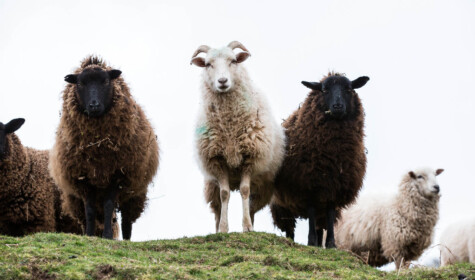If fully implemented, the recommendations would make it impossible to introduce sustainable and restorative farming systems in countries like the UK, where a high proportion of farmland is only suitable for growing grass. In addition, grass and grazing animals need to be reintroduced into many all-arable crop rotations to address the serious problems of soil degradation and biodiversity loss.
The failure to make a stronger recommendation in relation to reducing poultry meat consumption is misguided. We recognise that meat consumption overall needs to be reduced, but poultry are in direct competition with humans for grain. Although intensive cattle in some countries are fed on grain, ruminants in many countries predominantly eat grass and arable by-products which humans cannot digest. In relation to the environment, our analysis is that for net greenhouse gas emissions, soil degradation, biodiversity, diffuse agrochemical pollution and human health, reductions need to be made in meat that is largely fed on grain, not meat that is predominantly fed on grass. [3]
Patrick Holden, chief executive of the SFT said, “We welcome the fact that the report highlights the urgent need for fundamental change in farming systems and diets. However, it does little to inform the public about the path to a sustainable future and in some key respects will make things worse. A key weakness in the report is the failure to fully differentiate between livestock that are part of the problem and those that are an essential component of sustainable agricultural systems. This results in messages that are likely to add to existing confusion around what constitutes a healthy and sustainable diet.
The report also places blind faith in the vague and unproven concept of ‘sustainable intensification’. It assumes this will bring dramatic increases in yield and reductions in pollution claimed by the agrochemical and seed companies which expect to benefit financially from a range of new technologies, each of which will bring its own additional problems, as well as some possible advantages.”
Many of the report’s recommendations, such as increased consumption of vegetables, whole grains, nuts and legumes are all sound, but when it comes to protein and fats the recommendations to depend so heavily on plant sources, poultry rather than red meat and unsaturated fats compared with saturated fats are fundamentally flawed. Humans have evolved as red meat eaters and, providing this is part of a balanced diet, beef and lamb provide superior types of protein and fat to plant sources. [4]
Fats make up 36% of daily energy intake in the UK. But rather than getting these from UK grassland via meat and dairy products in an environmentally friendly way as we once did, consumers currently get these from palm oil and soyabean oil, associated as they are with devastating environmental destruction, and from rape and sunflower oil, the production of which have been major causes of pollinator decline due to the high need of these crops for insecticides when grown as monocultures. Over the last decade a large number of studies in leading peer-reviewed journals, including one in the Lancet itself [5] have challenged the belief that saturated fats are inherently harmful. The fact that this evidence has been completely overlooked by authors suggests that, in this area at least, they may be driven more by ideology than a balanced assessment of the evidence.
We are also particularly concerned by the report’s recommendations in relation to nitrogen fertiliser use. The authors correctly identify that excessive nitrogen fertiliser use in farming has caused humanity to exceed sustainable planetary boundaries for reactive nitrogen. Yet they fail to advocate forage legumes as a sustainable alternative source of nitrogen and instead recommend maintaining current fertiliser usage levels by increasing use in developing countries to match any decreases that can be achieved in developed countries. We feel this is a fundamental error which will accelerate the rate of soil degradation and loss and ultimately reduce yields in some of the most vulnerable communities.
Many studies have shown that in drought-prone regions of the world, in particular, and areas with poor soil quality, the most important thing is to maintain or build soil organic matter and this can only be achieved sustainably by integrating crop and livestock production and introducing nitrogen by deep-rooting leguminous plants rather than soluble fertiliser.
ENDS
For more information please contact:
Megan Perry – Communications Manager, Sustainable Food Trust
megan@sustainablefoodtrust.org
07761804341
Notes for Editors
[1] The Sustainable Food Trust is a registered charity, founded in 2011 by Patrick Holden CBE, that works globally to accelerate the transition to more sustainable food systems. For more information see: https://sustainablefoodtrust.org
[2] Food in the Anthropocene: the EAT-Lancet Commission on healthy diets from sustainable food systems. Commissioned by The Lancet, published 17th January 2019 and authored by scientists and researchers from around the globe. http://www.thelancet.com/commissions/EAT
[3] You can read Richard Young’s response to the study by Poore and Nemecek here: https://sustainablefoodtrust.org/articles/claims-against-meat-fail-to-see-bigger-picture/
[4] Encouraging a dramatic shift to plant-based diets risks a rise in nutritional deficiency diseases. Plants do not contain the full range of essential amino acids, or adequate levels of some B vitamins and a number of other important micro-nutrients. Vegans can compensate for these with supplements and careful dietary choices, but need a higher than average knowledge of nutritional science in order to do so.
[5] Dehghan et al. 2017, ‘Association of fats and carbohydrate intake with cardiovascular disease and mortality in 18 countries from five countries (PURE): a prospective cohort study, Lancet 390:2050-62 https://www.thelancet.com/journals/lancet/article/PIIS0140-6736(17)32252-3/fulltext


